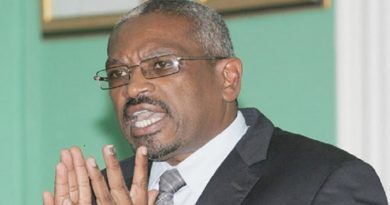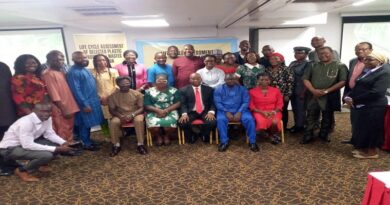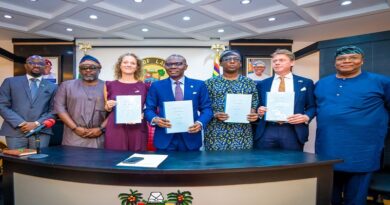Elimination of lead in paint in Nigeria: New standard to emerge as SRADev, SON sensitise stakeholders
Photo caption: Group photograph of participants at the one-day workshop on awareness raising on elimination of lead in paint organised by SRADeve Nigeria held in Lagos on 14 June 2024.
Ahead of January 1, 2025 target of no lead above 90 part per million (ppm) in paints produced in Nigeria, a new Standard that will give a legal backing to the decision will soon emerge courtesy of a review of the 2017 standards which had become obsolete.
Already, a draft Standard has been prepared after a two-day rigorous exercise by the Technical Committee penultimate week in Lagos and would be presented to the Council for approval any moment soon.
Recall that the National Environmental Standards, Regulations and Enforcement Agency (NESREA) with the support of Sustainable Research and Action for Environmental Development (SRADev Nigeria) and other stakeholders has crafted regulations to regulate lead in paint. The regulation has been gazetted just precisely in January this year.
However, the last standards developed in 2017 did not even talk about how paints manufactured in Nigeria should be labelled so that any user of paint will know the type to purchase.
In view of that and the need for paint produce in Nigeria to conform to the global best practice, SRADev Nigeria approached the Lead Exposure Elimination Project (LEEP), an international non-governmental organization working in more than 20 countries on elimination of lead in paint that has been supporting the process in Nigeria to support a review of the standards.
It was in the light of this that a two-day technical committee on paints varnishes and allied products/awareness raising workshop on eliminating lead paints in Nigeria was held from 13-14 June 2024 in Lagos. The Technical Committee meeting which culminated in an awareness raising workshop was attended by Small and Medium Enterprises (SMEs) paint manufacturers and other stakeholders.
Executive Director, SRADev Nigeria, Dr. Leslie Adogame, stated at the workshop, “Lead is dangerous to humans, especially children and we have continued to use it despite its adverse effect on our health. There has been a national campaign since 2009 globally for elimination of lead in paint.
“This event is a climax of a series of national activities, which we have been facilitating as civil society. What we have basically been doing is to help midwife a national process that will lead to a total elimination of lead in paint from Nigeria.
“What this event basically has done is a climax because we have supported the government to a point that National Environmental Standards and Regulations Enforcement Agency (NESREA) has crafted regulations to regulate lead in the environment in paint. That regulation has been gazetted just precisely in January. We had to move to the next stage of getting support from our sponsors to say standards have been a bit obsolete, you know, since 2017 and it needs to be upgraded because the standard don’t even talk about how paints manufactured in Nigeria should be labelled. We mean mandatory kind of labelling so that any user of paint will know that okay, this paint I shouldn’t buy that.
“I can tell you authoritatively that the Technical Committee meeting that’s going on has adopted and agreed that all the marking instructions on all paints made in Nigeria now will carry no added lead, so it’s a big win in the sense that we can now say anybody going to the paint market from once this standard is finally approved by Council should go out to look for a paint that is marked no added lead, that means no intentionally added lead. It means that that paint is within 90 parts per million.
“So, we are using a tripartite approach, working with the Ministry of Environment, Standards Organisation of Nigeria (SON) and this event is just an awareness to harmonise all these different regulations and standards that are coming up so that Nigerian stakeholders understand the importance on how to be able to imbibe them.
“The focus entirely is the SMEs who are the major culprits, they are the ones who adulterate paints, they are the ones who use sub-standard additives and all that, so we brought them together to raise an awareness to say there is a regulation now, there is a standard now that says 90 parts per million; so very soon buyers of paint should look out for no added lead in paint before you buy.”
Programme Manager, Lead Exposure Elimination Project (LEEP), Yujin Han, noted that the awareness raising workshop followed the Technical Committee’s review of the standard on lead paint, according to standard regulation the International accepted limit is 90 parts per million for lead paint production.
She said: “LEEP works with both the government to ensure that there’s regulation and that the regulation is being enforced and then we also work with manufacturers and our work with manufacturers helps connect them with lead free raw materials to ensure that they’re able to reformulate and what we do know is that it’s entirely possible to make lead free paint along same lines of the quality that customers expect.
“Just like we have done in countries such as Pakistan and Malawi, among others, our work in Nigeria has been going on since last year and we’ve been partnering the SRADev Nigeria who has been an incredible local NGO, and so the work that we’re doing currently has included gazetting, helps supporting Nigeria in gazetting the regulation and then also supporting the Technical Committee members to review the standard and so we see that lead paint regulation and standards are an effective way of getting lead paint off the market.”
Han added that elimination of lead in paint contributes to sustainable development and that Nigeria government is showing leadership in that direction.
Representative of Standards Organisation of Nigeria (SON), Mr. Paul Pankes, said the draft standard will be subjected to the Council for approval adding that it has to follow the standards development procedure. “The standard is still a work in progress”, he stated.
Chairman of the Technical Committee, Prof. (Mrs.) Kehinde Folayinka, said the committee want to make sure that the standard is a collective agreement that will represent the different stakeholders. “The issue of lead in paint is not something that should be taken for granted. It’s a very big issue and that is why the TC does not want to take it for granted”, she stated.
Mrs. Theresa Ojomo, Head of Regional Operations, SON, emphasised that the basic requirement for paint production must not be more than 90 parts per million. According to her “labelling is also very important for all products”.
She said a six-month timeframe has already been given to paint manufacturers to exhaust the already imported materials into the country and, by January 2025, the Federal Government will not allow any lead paint in the country and by then the SON will have the constitutional rights to arrest, apprehend and prosecute any erring manufacturer that’s found wanting.
Mr. Adebolu Babatunde, Chairman, Paints Manufacturers Association of Nigeria (PMA), said: “Of course, lead get into paints via two materials, these are the lead and the very bright pigment called crumbs and for lead I think there is a clear substitute for lead driers and that has been in use in the industry for more than 15 years. But for the pigments that produces bright colour we have to change from those containing crumbs that bring lead to the organic type but there are challenges which have been highlighted, it is left for paint manufacturers to move to the alternative and that is the awareness that have been passed on to the public via this programme today.”
As regards the January 2025 deadline given by SON on the enforcement, Babatunde, who also doubled as the Chairman, Technical Committee Chairman for Manufacturers, said: “When we get to the bridge we will cross it, we are in Nigeria, and we know there are a lot of considerations that have to be in place. First, we have to exhaust the materials already imported into the country after which we consider moving into the alternative options, though the alternative is here already but not in the volume the paint market is used to.”
Executive Secretary, Paint Manufacturers Association (PMA), a sub-section of the Manufacturers Association of Nigeria, Mr. Jude Maduka, said SMEs in paint industry needs technical and financial support. He stressed that the paint materials are not produce in Nigeria, hence, the paint manufacturers buy the materials that are available in the country.
Through the support of LEEP, SRADev Nigeria has organized awareness workshop for SMEs paint manufacturers in the Northern part of Nigeria held in Abuja; the South-West region held in Ibadan and the most recent one for the South East/South-South held in Onisha.




